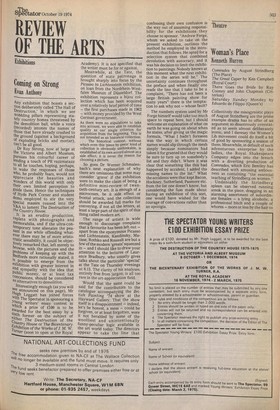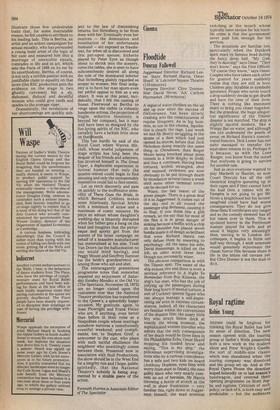Theatre
'Woman's Place
Kenneth Hurren
Comrades by August Strindberg (The Place) The Great Caper by Ken Campbell (Royal Court) There Goes the Bride by Ray Cooney and John Chapman (Criterion) Saturday Sunday Monday by Eduardo de Filippo (Queen's)
Collectively the misogynistic plays of August Strindberg are the prime example drama has to offer of an argument so disastrously overstated as to seem almost deliberately ironic, and I daresay the Women's Lib movement could do itself a bit of good by sponsoring a season of them. Meanwhile, in default of such adventurous enterprise by the ladies, the Royal Shakespeare Company edges into the breach with a diverting production of Comrades, which Eric Bentley has described with amusing seriousness as containing "the essential teaching of Strindberg on women."
Undeniably the Strindberg spleen can be observed running amok in the piece, dragging in an alarming assortment of subordinate females — a lying alcoholic, a professional bitch and a couple of whores — more or less by the hair to illustrate those few undesirable traits that, for some inscrutable reason, he felt unable to attribute to his leading lady. This is Bertha, an artist and an ardent campaigner for sexual equality, who has persuaded a young male artist of the logic of her case and ensnared him into a marriage of ostensible equals, comrades in life and in art, which sets the Paris of 1889 on its ear by its unorthodoxy. Bertha, of course, is not only a terrible painter with no justifiable claim to equality on that score (the RSC production puts the evidence on the stage in two ghastly canvases) but a sly, dishonest, disloyal and deceitful woman who could give cards and spades to the average viper.
Dramatically, the revelations of her shortcomings are quickly sub
ject to the law of diminishing returns, but Strindberg is far from done with her. Eventually even her motives — the domination and humiliation of her unfortunate husband — are exposed as fraudulent, for when all is discovered and this put-upon spouse, hitherto played by Peter Eyre as though about to shrink into the scenery, turns the tables, she is seen to have subconsciously desired all along the role of the dominated inferior that Strindberg plainly regarded as proper to women. Her final indignity is to have her man spurn even her pitiful appeal to him as a sex object. It was at this point, incidentally, that I felt the casting of Susan Fleetwood as Bertha to verge upon the risible (a robustly handsome actress, the projection of fragile, seductive femininity is beyond her compass),, but it may well have been so designed by the fun-loving spirits of the RSC, who certal have a larkish little show on thei hands. This can hardly be said of the Royal Court where Warren Mitchell, whose woeful judgement of stage scripts has long been the despair of his friends and admirers, has involved himself in The Great Caper, a deplorable experiment in surreal humour that only the quarter-witted could begin to find amusing and only the unreasonably insensitive could fail to find emetic.
Let us retch discreetly and pass on quickly to the inoffensive imbecility of There Goes the Bride, in which Bernard Cribbins makes some hilariously farcical bricks with a minimum of straw and a maximum of comic resource. He plays an adman whose daughter's wedding-day is bizarrely disrupted when her father gets a bang on the head and imagines that the picturesque and sporty girl from the posters of his latest campaign on behalf of a brassiere manufacturer has materialised at his side. Trudi Van Doom (as the hallucination no one would mind having), and Peggy Mount and Geoffrey Sumner (as the bride's grandparents) are among those who aid and abet.
The extravagantly pretentious programme notes that somewhat impaired my enjoyment of Saturday Sunday Monday at the Old Vic (The Spectator, November 10,1973) are no longer visited upon the customers now that the National Theatre production has transferred to the Queen's, a splendidly happy occasion. My gratitude, again, to Joan Plowright and Frank Finlay who are, if anything, even better than before in their roles as a Neapolitan couple whose marriage somehow survives a tumultuously eventful weekend; and compliments, too, to Stephen Greif, a newcomer to the cast, who plays with such tactful ebullience the neighbour who unwittingly comes between them. Presented now in association with Stoll Productions, the show should be in the West End for a lengthy run and I hope, public spiritedly, that the National Theatre's subsidy is being augmented by a sizable piece of the action.
Kenneth Hurren is Associate Editor of The Spectator



































 Previous page
Previous page